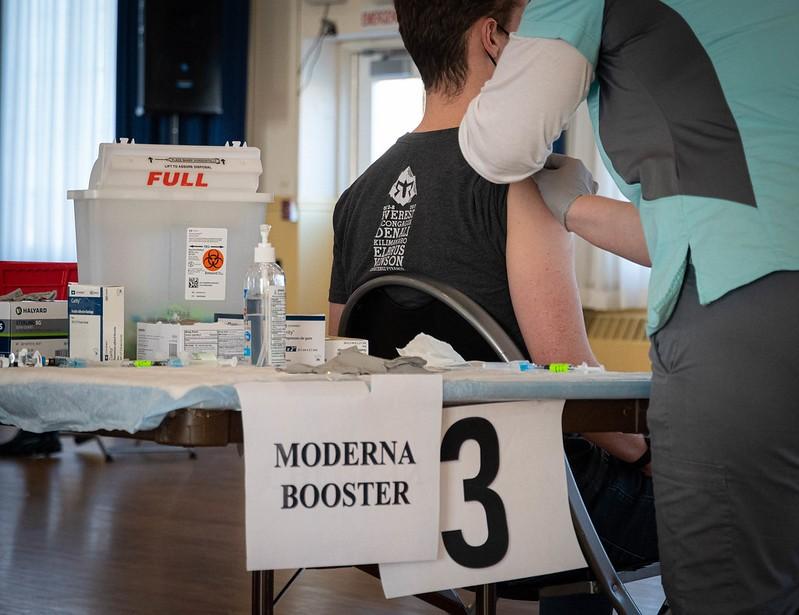Studies from the Centers for Disease Control and Prevention (CDC) today show a significant bump in protection against the highly transmissible Omicron COVID-19 variant after a booster dose, resulting in fewer hospitalizations, emergency visits, deaths, and cases in people who had received three doses of mRNA vaccines.
Two of the studies—one on hospitalizations, emergency room visits, and urgent care visits and the other on cases and deaths—were published in Morbidity and Mortality Weekly Report (MMWR), and a third study on cases was published in JAMA.
"These reports add more evidence to the importance of being up to date with COVID vaccinations—that means getting primary series, and boosted when eligible to protect against severe COVID 19," said CDC Director Rochelle Walensky, MD, MPH, during a White House press briefing on the pandemic.
The first study in MMWR shows that three mRNA vaccine doses were able to prevent hospitalizations for 94% of recipients during the Delta surge and 90% of people during Omicron. The boosters offered a significant bump in protection; without the third dose, two vaccine doses were only 57% effective at preventing hospitalization from Omicron if it had been more than 6 months since completing the primary two-dose vaccination series.
For Delta, protection against hospitalization more than 6 months after the primary series, but before a booster dose, was 81%.
Visits to emergency rooms and urgent care centers also were reduced with booster shots. A booster dose was 94% and 82% effective in preventing these visits for Delta and Omicron, respectively.
Unvaccinated 5 times more likely to get Omicron
Another study gauged the incidence and fatality rates among unvaccinated, vaccinated, and boosted Americans from April through December of 2021, showing how the vaccines performed during the times when both Delta and Omicron emerged as the dominant strains.
Overall, the vaccines and boosters performed better when Delta was dominant.
"During October–November, unvaccinated persons had 13.9 and 53.2 times the risks for infection and COVID-19–associated death, respectively, compared with fully vaccinated persons who received booster doses, and 4.0 and 12.7 times the risks compared with fully vaccinated persons without booster doses," the authors said.
When the Omicron variant emerged during December 2021, the authors wrote, case and death rates and incidence rate ratios decreased to 4.9 for fully vaccinated persons with booster doses, and 2.8 for those without booster doses.
The added benefit of boosters was especially significant among Americans aged 50 and older.
In the JAMA study, CDC researchers found that, among 70,155 tests from symptomatic adults with COVID-like illness conducted from Dec 10, 2021 to Jan 1, 2022, receipt of three mRNA vaccine doses was reported in 2,441 Omicron patients (18.6%), 679 Delta patients (6.6%), and 18,587 of those who weren't infected (39.7%). With two mRNA doses, the percentages were much higher: 55.3%, 44.4%, and 41.6%, respectively.
Compared with being unvaccinated, the odds of contracting Omicron after receiving three vaccine doses fell 67%, and for Delta the risk declined 93%, the data reveal.
The study authors concluded, "These findings suggest that vaccination with 3 doses of mRNA COVID-19 vaccine, compared with being unvaccinated and with receipt of 2 doses, was associated with protection against both the Omicron and Delta variants, although higher odds ratios for the association with Omicron infection suggest less protection for Omicron than for Delta."
In an editorial on the study, Saad Omer, MPH, PhD, of Yale and JAMA Associate Editor Preeti Malani, MD, MSJ, write that the study supports the current booster recommendations in the United States. But the authors warn that, in most of the world and parts of the United States, the primary task of managing the pandemic needs to be vaccinating the unvaccinated—not offering booster doses.
"In many countries, including the US, the pandemic continues to be substantially driven by unvaccinated individuals. While it is useful to provide booster vaccinations, particularly to high-risk groups, only vaccinating those who are not yet vaccinated will result in sustainable control of COVID-19 and prevent additional morbidity and mortality," the authors write.
In related news, updated CDC data show that, from late November to late December, the rate of breakthrough infections among the fully vaccinated increased fourfold, ABC News reports.
Cases decline across US
Coronavirus infections have declined over the past week in 15 states plus Washington, DC, and Puerto Rico, according to a Reuters analysis. In the Northeast, infections are down 36% week-over-week. But cases are still climbing in the Midwest, West, and South.
Today, Walensky said cases were decreasing in some parts of the country but the 7-day average of new daily cases was 744,616, down 5% from the previous week.
The United States reported 644,814 new COVID-19 cases yesterday and 2,479 deaths, according to the Johns Hopkins COVID-19 tracker.
The CDC COVID Data Tracker shows that 63.1% of Americans are fully vaccinated against COVID-19, 75.3% have received at least one dose of vaccine, and 39.3% of vaccinated Americans have received a booster dose.






















